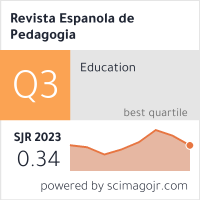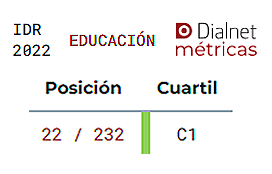Abstract
The introduction of the analytical method to the field of the philosophy of education led to a first golden age, which, as the method closed in on itself and isolated itself from educational reality, resulted in an epistemological and institutional crisis. In view of that crisis, the generations following that first period began a lively debate on how to move forward. This article, with the aim of considering the positions proposed, derives from this latter scenario. Its method is characterized by two basic elements. The first is a systematic review of all articles on philosophy of education by the main authors in the discipline. The second is a hermeneutic exercise that attempts to compose a unitary discourse combining the main sensitivities of all of them. This results in the identification of five notable groups that differ mainly in the relationship that philosophy of education must maintain with educational practice and, consequently, in how the philosopher’s exercise of education should be considered. This leads into a discussion about whether it is possible to consider all of these positions as integral parts of a whole that seeks to understand the phenomenon of education and improve it overall instead of regarding them as parts in themselves. If there is one reasonably clear conclusion, it is that it seems unlikely that a unifying perspective like the analytical one will reappear and that a dynamic of reciprocal dialogical relations is necessary as a new emerging paradigm.
This is the English version of an article originally printed in Spanish in issue 272 of the revista española de pedagogía. For this reason, the abbreviation EV has been added to the page numbers. Please, cite this article as follows: Luque, D. (2019). Desarrollos interpretativos de la filosofía de la educación en la tradición anglófona: un intento de sistematización | Interpretive developments of the philosophy of education in the anglophone tradition: an attempt to systematise them. Revista Española de Pedagogía, 77 (272), 67-82. doi: 10.22550/REP77-1-2019-08
Referencias | References
Biesta, G. (1999). The Right to Philosophy of Education: From Critique to Deconstruction. In S. Tozer (Ed.), Philosophy of Education 1998 (pp. 476-484). Urbana, Illinois: Philosophy of Education Society.
Biesta, G. (2011a). Introduction: What’s the Use of Philosophy of Education? In G. Biesta (Ed.), Philosophy of Education 2010 (pp. xi-xiii). Urbana, Illinois: Philosophy of Education Society.
Biesta, G. (2011b). Disciplines and theory in the academic study of education: a comparative analysis of the Anglo-American and Continental construction of the field. Pedagogy, Culture & Society, 19 (2), 175-192.
Biesta, G. (2012a). Philosophy of Education for the Public Good: Five challenges and an agenda. Educational Philosophy and Theory, 44 (6), 581-593.
Biesta, G. (2012b). (Re)constructing the Theory and Philosophy of Education: An Introduction. In G. Biesta (Ed.), Making Sense of Education (pp. 1-4). Boston: Springer.
Biesta, G. (2014). Is philosophy of education a historical mistake? Connecting philosophy and education differently. Theory and Research in Education, 12 (1), 1-12.
Burbules, N. (1989). Issues and Trends in the Philosophy of Education. Educational Administration Quarterly, 25 (3), 229-252.
Burbules, N. (1991). Continuity and diversity in Philosophy of Education: An Introduction. Educational Theory, 41 (3), 257-263.
Burbules, N. (1995). Postmodern doubt and philosophy of education. In General Session at the Philosophy of Education Society. Retrieved from http://public.callutheran.edu/~mccamb/burbules.htm (Consulted on 12/11/2016).
Burbules, N. (2000). Postmodernism for Analytic Philosophers of Education. Philosophy of Education Society of Australasia, 32 (3), 311-315.
Burbules, N. (2002a). The Dilemma of Philosophy of Education: «relevance» or critique? Educational Theory, 52 (3), 349-357.
Burbules, N. (2002b). Where is philosophy of education today: at the start of a new millennium or at the end of a tired old one? Philosophical Studies in Education, 33, 13-23.
Burbules, N., & Abowitz, K. K. (2009). A Situated Philosophy of Education. In R. D. Glass (Ed.), Philosophy of Education 2008 (pp. 268-276). Urbana, Illinois: Philosophy of Education Society.
Burbules, N., & Raybeck, N. (2003). Philosophy of education: Current trends. In James W. Guthrie (Ed.), Encyclopedia of Education (pp. 1880-1885). New York: Macmillan.
Chambliss, J. J. (2009). Philosophy of education today. Educational Theory, 59 (2), 233-251. Curren, R. (1999). Philosophy of Education at the Millennium. Retrieved from https://ojs.education.illinois.edu/index.php/pes/article/viewFile/2019/714 (Consulted on 12/12/2017).
Curren, R. (2003). Preface. In R. Curren (Ed.), A Companion to The Philosophy of Education (pp. 1-4). Oxford: Blackwell Publishing Ltd.
Curren, R. (2005). Philosophy of Education, Ethical and Political Issues. In Encyclopedia of Philosophy. Retrieved from http://www.encyclopedia.com/humanities/encyclopediasalmanacs-transcripts-and-maps/philosophyeducation-ethical-and-political-issues (Consulted on 12/12/2017).
Curren, R. (2007). Philosophy and the Necessity of Public Education. Philosophy Now, 63, 24-27. Retrieved from http://www.philosophynow.org/issue63/63curren.htm (Consulted on 07/12/2016).
Curren, R. (2009). Analytic Philosophy. In J. Collins & N. O'Brien (Eds.), The Greenwood Dictionary of Education (p. 19). Westport, CT: Greenwood Press.
Curren, R. (2010). Aristotle’s educational politics and the Aristotelian renaissance in philosophy of education. Oxford Review of Education, 36 (5), 543-559.
Curren, R. (February, 2016). Historicizing Philosophy of Education: A Modest Plea for Analytic History and Philosophy of Education. Conference on the relationship between historical and philosophical study of education, Ohio State University, Columbus, Ohio.
Curren, R. (2017). Philosophy of Education: its current trajectory and challenges. In M. A. Peters (Ed.), Encyclopedia of Educational Philosophy and Theory (pp. 1863-1866). Singapore: Springer.
Curren, R., & Dorn, C. (2018). Patriotic education in a global age. Chicago and London: The University of Chicago Press.
Curren, R., & Metzger, E. (2017). Living well now and in the future: why sustainability matters. Cambridge, MA: The MIT Press.
Curren, R., Robertson, E., & Hager, P. (2003). The Analytical Movement. In Randall Curren (Ed.), A Companion to The Philosophy of Education (pp. 176-191). Oxford: Blackwell Publishing Ltd.
Edel, A. (1972). Analytic Philosophy of Education at the Cross-Roads. Educational Theory, 22 (2), 131-152.
Evers, C. W. (1993). Analytic and post-analytic philosophy of education: methodological reflections. Discourse: Studies in the Cultural Politics of Education, 13 (2), 35-45.
Griffiths, M. (2014). Re-thinking the relevance of philosophy of education for educational policy making. Educational Philosophy and Theory, 46 (5), 546-559.
Griffiths, M. (1997). Why teachers and philosophers need each other: philosophy and educational research. Cambridge Journal of Education, 27 (2), 191-202.
Masschelein, J. (2011a). Philosophy of Education. Bajo Palabra, 6, 39-40.
Masschelein, J. (2011b). Philosophy of Education as an Exercise in Thought: to not forget oneself when «things take their course». European Educational Research Journal, 10 (3), 356-363.
Masschelein, J. (2014). Pedagogue and/or philosopher? Some comments on attending, walking, talking, writing and… caving. In L. J. Waks (Ed.), Leaders in Philosophy of Education (pp. 197-210). Rotterdam: Sense Publishers.
McCulloch, G. (2002). «Disciplines contributing to education»? Educational studies and the disciplines. British Journal of Educational Studies, 50 (1), 100-119.
Peters, R. S. (1963). Ethics and Education. London: George Allen & Unwin Ltd.
Richardson, W. (2002). Educational Studies in the United Kingdom, 1940-2002. British Journal of Educational Studies, 50 (1), 3-56.
Roberts, P. (2009). Hope in troubled times? PESA and the future of philosophy of education. Educational Philosophy and Theory, 41 (7), 811-813.
Roberts, P. (2014). «It was the Best of Times, it was the Worst of Times…»: Philosophy of Education in the Contemporary World. Studies in Philosophy of Education, 34 (6), 623-634.
Roberts, P., & Stewart, G. (2016). Philosophy of education, dialogue and academic life in Aotearoa-New Zealand. Policy Futures in Education, 14 (2), 238-251.
Ruitenberg, C. (2009). Introduction: The Question of Method in Philosophy of Education. Journal of the Philosophy of Education, 43 (3), 315-323.
Ruitenberg, C. (2014). «Play well with Others»: The engagement of philosophy of education with other educational research. Theory and Research in Education, 12 (1), 88-97.
Ryan, R. M., Curren, R., & Deci, E. L. (2013). What Humans Need: Flourishing in Aristotelian Philosophy and Self-Determination Theory. In A. S. Waterman (Ed.), The Best Within Us: Positive Psychology Perspectives on Eudaimonia (pp. 57-75). Washington, DC: American Psychological Association.
Scheffler, I. (1954). Toward an Analytic Philosophy of Education. Harvard Educational Review, 24, 223-230.
Scheffler, I. (1965). Conditions of knowledge. An Introduction to Epistemology and Education. London & Chicago: University of Chicago Press.
Scheffler, I. (2008). Foreword. In L. J. Waks (Ed.), Leaders in philosophy of education (pp. xi-xvi). Taipei: Sense Publishers. Siegel, H. (1981a). The future and purpose of Philosophy of education. Educational Theory, 31 (1), 11-15.
Siegel, H. (1981b). How «practical» should philosophy of education be? Educational Studies: a Journal of the American Educational Studies Association, 12 (2), 125-134.v
Siegel, H. (1983). On the obligations of the professional philosopher of education. Journal of Thought, 18 (2), 31-37.
Siegel, H. (2009). Introduction: Philosophy of education and Philosophy. In H. Siegel (Ed.), The Oxford Handbook of Philosophy of Education (pp. 3-8). New York: Oxford University Press.
Siegel, H. (2017). The Philosophy of Education and the tyranny of the Practice. In M. Spieker & Stojanov (Eds.), Bildungsphilosophie. Disziplin - Gegenstandsbereich - Politische Bedeutung (pp. 19-36). Deutschland: Nomos Verlagsges. Smeyers, P. (2006). What philosophy can and cannot do for education. Studies in Philosophy of Education, 25 (1-2), 1-18.
Smeyers, P. (2010). Revisiting philosophy of education. Teoría de la Educación, 22 (1), 91-116.
Smeyers, P. (2011). Philosophy of… Philosophy and…: taking the conditions we find ourselves in seriously. European Educational Research Journal, 10 (3), 292-303.
Citación recomendada | Recommended citation
Luque, D.
(2019)
.
Interpretive developments of the philosophy of education in the anglophone tradition: an attempt to systematise them.
Revista Española de Pedagogía, 77(272).
https://www.revistadepedagogia.org/rep/vol77/iss272/12
Licencia Creative Commons | Creative Commons License
Esta obra está bajo una licencia internacional Creative Commons Atribución-NoComercial 4.0.
This work is licensed under a Creative Commons Attribution-NonCommercial 4.0 International License
Palabras clave | Keywords
anglophoneeducationalhistory, Educationalphilosophy, educationalpractices, educationaltheories, scientificresearch









